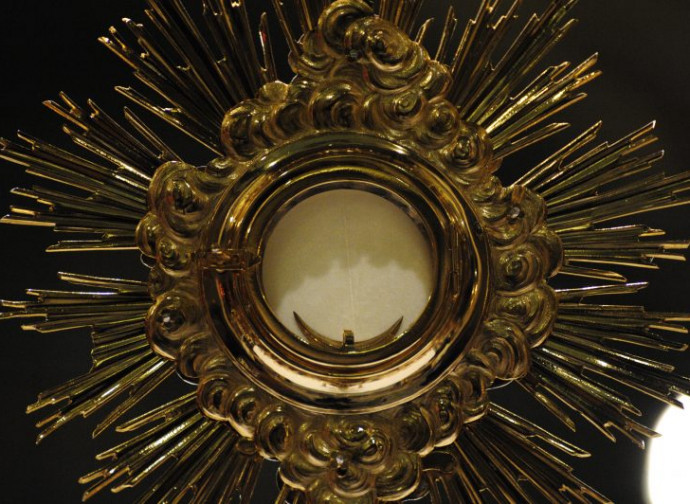Jesus is Truly Present in the Eucharist, Just as 2000 Years Ago He Was On The Cross
On the Solemnity of the Body and Blood of the Lord we especially exalt what is celebrated in every Mass: the truth of the presence of His Body offered in sacrifice for us and of His Blood shed on the Cross for the forgiveness of our sins. Today, in many parts of the world, the obligation to attend Mass is dispensed, processions are prohibited, Communion is given in the hand, desacralizing the Eucharistic mystery. It is urgent, more than ever before, to return to adoration of the Most Blessed Sacrament to make reparation for the outrages against this infinite gift of Love.

The Solemnity of Corpus Christi is the result of events arranged by Divine Providence (learn more about the story here). In celebrating the Solemnity of the Body and Blood of the Lord we exalt what is celebrated in every Mass: the truth of the presence of His Body offered in sacrifice for us and His Blood shed on the Cross for the forgiveness of our sins.
Two thousand years ago Jesus shed His Blood for us on the Cross, and so today he gives us His Blood in every Eucharist. Since the purpose of Eucharistic worship is to exalt faith in the Living Presence of the Lord, to adore Him in the Most Blessed Sacrament and to make reparation, the need to recall the meaning of this Solemnity is today more urgent than ever. Today in many parts of the world the obligation to attend Mass on Sundays and Holy Days is dispensed from, processions are prohibited, and Communion in the hand is strongly imposed. Every excuse is found for desacralizing this Holy Sacrament.
It is urgent, therefore, to bring back many of the faithful who have been confused, scandalized, and saddened, restoring them to the faith and the light of truth. For example, there are those who have heard high prelates say that “The Lord said ‘Take and eat,’ not, “Open your mouth.” Other prelates categorically forbid the restoration of perpetual adoration because they say it is “an extremely personalistic devotion.”
Above all else, the Eucharist is the infinite gift of God to man because it is the gift of Himself. It was given to us to be celebrated and also to be adored. Celebration and adoration are so intimately connected that there can be no fruitful celebration of the Eucharist that is not also adoration, no adoration of the Eucharist that does not prepare for and lead to its worthy celebration. The Holy Spirit, who transforms “earthly things – bread and wine – into a divine mystery” is the One who in adoration continues His work in us.
Adoration prepares for the Eucharistic celebration because it prepares the heart for a personal encounter with the One who is Our Creator and Savior. Without adoration there is no true Eucharistic worship, since the entire Eucharistic liturgy is an act of adoration, with its culminating moments in the Consecration and sacramental Communion.
On the other hand, receiving Holy Communion on the tongue and kneeling is the way that most perfectly reflects the reality of the divine gift of the Eucharist: because it is essentially a gift, I receive it, I do not take it myself. And in order to believe with firm faith that it is truly God, hidden in the Eucharistic species, I adore Him by the act of kneeling. And again, “Take and eat” does not mean that the Sacred Host should be taken in the hand, but rather the Lord’s command, “take” [accipite], means “receive.” It is the invitation to receive it as a gift, not to take it in the hands.
Perpetual adoration, and indeed all Eucharistic adoration, is not personalist, if by personalist we mean “self-focused” in a pejorative way, but rather it is a most personal encounter in which friendship with the Lord is cultivated and we respond to His call, not only drawing close to Him but entering into the secret of His Heart that was wounded and pierced for each one of us. In adoration we go to Him in order to then reach out to those who need Him, those who know nothing of God and who live in darkness and despair, or to those who are naked and sick in body and spirit in order to bring them the peace that the Blessed Sacrament has radiated upon us.
Perpetual adoration of the Eucharist originates as a response of faith and love from people who are faithful to the Lord, who is constantly present in our midst with “a presence that is tangible, close, in our homes, as the “beating heart” of the city...” (Benedict XVI, Homily for Corpus Domini, 7 June 2012). For this reason, both the Feast of Corpus Christi and the chapels where the Lord is adored remind us that “the Sacrament of Christ’s Charity must permeate the whole of daily life” (ibidem).
The traditional procession of Corpus Christi, which is now almost completely forbidden, is a fundamental part of the annual feast day dedicated to the Body and Blood of the Lord, because it is Jesus Christ who passes through our midst, followed by the adoration of His people.
Let us not lose sight of the meaning of this Solemnity: motivating the faithful to adore the Eucharist, progressing in the practice of virtue and making reparation for the offenses committed against the Most Blessed Sacrament.
For this reason, celebrating the Body and Blood of Christ today means recalling once more with a grateful heart the infinite gift of the love of God and consequently adoring Him and making reparation for the outrages and sacrileges committed both within His Church as well as outside it. The duty of pastors is to guide the faithful toward this personal encounter with the Lord in order to remove every impediment in this sense.
